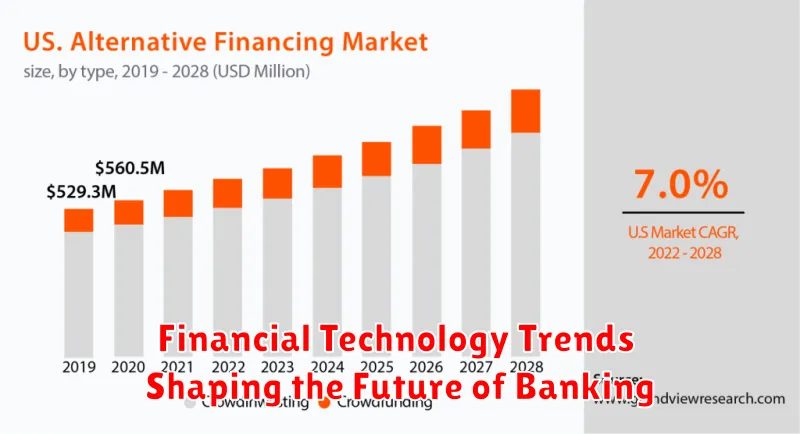The financial landscape is undergoing a rapid transformation, driven by groundbreaking advancements in financial technology, commonly known as FinTech. These FinTech trends are reshaping the future of banking in profound ways, impacting everything from how we manage our finances to how institutions operate. Understanding these key financial technology trends is crucial for both consumers and financial professionals seeking to navigate this evolving environment. This article will explore the most impactful FinTech trends shaping the future of banking, covering areas like artificial intelligence, blockchain, mobile banking, and regulatory technology (RegTech). These emerging technologies promise to revolutionize the banking industry, creating new opportunities and challenges for all stakeholders.
From the rise of digital banking and the increasing prevalence of contactless payments to the integration of big data analytics and the growing importance of cybersecurity, the FinTech revolution is redefining what it means to bank in the 21st century. This article will delve into the specific FinTech trends that are driving this transformation, examining their implications for traditional banks, FinTech startups, and consumers alike. By exploring the future of banking through the lens of financial technology, we can gain valuable insights into the forces shaping the financial world of tomorrow. Prepare to discover the key trends impacting the future of finance and how they are revolutionizing the banking industry as we know it.
Rise of Artificial Intelligence
Artificial intelligence (AI) is rapidly transforming the financial landscape, impacting areas from customer service to fraud detection and risk assessment. AI-powered chatbots provide 24/7 customer support, answering queries and resolving issues efficiently. Algorithmic trading leverages AI to analyze market data and execute trades at optimal times, often outperforming human traders.
Furthermore, AI plays a crucial role in fraud prevention by identifying suspicious transactions and patterns. Credit scoring models utilize AI to assess creditworthiness more accurately and efficiently, expanding access to credit for a wider range of individuals and businesses. This ultimately leads to a more streamlined and personalized banking experience for customers, while also improving operational efficiency and security for financial institutions.
Blockchain and Cryptocurrency Integration
Blockchain technology and cryptocurrencies are poised to revolutionize banking operations. Blockchain’s decentralized and secure nature offers potential benefits such as reduced transaction costs, faster processing times, and enhanced transparency.
Banks are exploring the integration of blockchain for various applications, including cross-border payments, know-your-customer (KYC) processes, and trade finance. Cryptocurrencies, while still facing regulatory scrutiny, are increasingly being considered for new financial products and services.
This integration could lead to more efficient and cost-effective banking services while potentially disrupting traditional financial intermediaries. However, challenges remain, including scalability, regulatory uncertainty, and public adoption.
Enhanced Digital Payment Solutions

The evolution of digital payment solutions is significantly impacting the financial landscape. Real-time payments are becoming increasingly prevalent, offering immediate transfer of funds between accounts. This speed and efficiency are transforming business operations and consumer spending habits.
Furthermore, the rise of mobile wallets and contactless payments is streamlining transactions. These technologies offer convenience and security, reducing reliance on physical cards and cash.
Biometric authentication adds another layer of security to digital payments, bolstering consumer trust and reducing fraud. These advancements contribute to a more seamless and secure payment experience for individuals and businesses alike.
Improved Cybersecurity Measures
Cybersecurity is more crucial than ever in the evolving financial landscape. With the rise of digital transactions and open banking, financial institutions are facing increasingly sophisticated cyber threats.
Enhanced security measures are being implemented to protect sensitive customer data and maintain the integrity of financial systems. These include advanced authentication methods like biometrics and multi-factor authentication, as well as robust encryption techniques and real-time fraud detection systems.
Investments in artificial intelligence and machine learning are also playing a key role in proactively identifying and mitigating cyber risks. These technologies can analyze vast amounts of data to detect anomalous patterns and prevent attacks before they occur.
Open Banking and APIs
Open banking, powered by APIs (Application Programming Interfaces), is revolutionizing the financial landscape. These APIs allow third-party developers to securely access customer banking data (with consent) and build innovative financial products and services. This fosters competition and drives the development of personalized, customer-centric solutions.
Benefits of open banking include enhanced financial management tools, streamlined loan applications, and more efficient payment systems. For example, budgeting apps can aggregate data from multiple accounts to provide a holistic financial overview. Similarly, businesses can leverage open banking to offer tailored financial products based on real-time transaction data.
Security remains paramount. Robust security measures and data privacy regulations are essential to maintaining consumer trust and ensuring responsible data sharing within the open banking ecosystem.
Personalized Financial Services
Personalization is a dominant trend reshaping financial services. Fintech empowers institutions to leverage data analytics and AI to understand individual customer needs and preferences.
This translates into tailored financial products, advice, and experiences. Imagine receiving investment recommendations specifically aligned with your risk tolerance and financial goals, or having access to customized loan options that perfectly suit your circumstances.
This shift towards personalization ultimately drives customer engagement and fosters stronger relationships between financial institutions and their clients.
Automation and Robotic Process Automation
Automation plays a crucial role in modern banking, streamlining operations and enhancing efficiency. It encompasses a wide range of technologies, from basic scripting to advanced artificial intelligence.
Robotic Process Automation (RPA), a subset of automation, focuses on automating repetitive, rule-based tasks. RPA utilizes “software robots” to mimic human actions, interacting with systems and applications just like a human employee would. This frees human workers to focus on more complex, strategic tasks.
Key benefits of RPA include reduced operational costs, increased accuracy, and improved compliance.
Biometric Authentication Growth

Biometric authentication is rapidly becoming a cornerstone of modern banking security. Its growth is fueled by the increasing need for stronger, more fraud-resistant security measures, coupled with consumer demand for convenient access to financial services.
Methods like fingerprint scanning, facial recognition, and voice biometrics offer a higher level of security compared to traditional passwords and PINs. This added security reduces the risk of unauthorized access and fraudulent activities, bolstering customer trust and minimizing financial losses for institutions.
The proliferation of smartphones with built-in biometric sensors has further accelerated adoption. This widespread availability makes implementation easier and more cost-effective for both banks and customers.
Increased Use of Cloud Technology
The financial industry is seeing a rapid increase in the adoption of cloud technology. This shift offers banks scalability, cost efficiency, and enhanced flexibility.
Cloud computing enables institutions to quickly adapt to changing market demands and customer expectations. It provides on-demand access to computing resources, reducing the need for large, in-house IT infrastructure.
Key benefits include improved data storage, disaster recovery capabilities, and the potential for faster innovation through streamlined development processes.
Environmental and Social Governance (ESG) in Fintech
Environmental and Social Governance (ESG) is rapidly gaining traction in the financial technology sector. Fintech companies are increasingly recognizing the importance of incorporating sustainability and ethical considerations into their operations and business models.
This includes focusing on reducing their own environmental footprint, promoting financial inclusion, and ensuring responsible data usage and governance. Investors and customers are increasingly demanding transparency and accountability from companies, pushing ESG to the forefront of decision-making.
Fintechs are uniquely positioned to leverage technology to address ESG challenges. For example, they can develop innovative solutions for green finance, improve access to financial services for underserved communities, and implement robust data privacy frameworks. Embracing ESG principles offers fintechs an opportunity to not only contribute to a more sustainable future, but also to enhance their long-term value and competitiveness.

